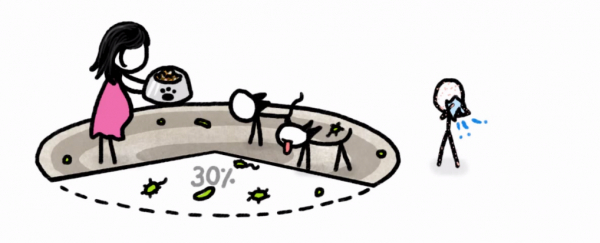
We love our pets! They're cuddly, cute, super smart (sort of), and we wouldn't trade them for anything in the world (and we totally don't understand people who aren't pet people).
We love our pets so much, we're willing to overlook some of their less attractive features. You know, the hairballs they sometimes cough up, the dog farts that linger for an excessively long time in your living room, the muddy paw prints on just about everything, and the seemingly endless supply of slobber.
(Okay, so writing that paragraph has made me reassess how much I actually love my dog).
As it turns out, however, these less-than-attractive qualities may actually be performing a very valuable service to our health, and could even protect the immune systems of unborn babies.
As Henry Reich from MinuteEarth explains in the episode above, "dogs and also cats influence the microbial communities in our homes so much that if your mother lives with a cat or a dog while she's pregnant with you, you're about 30 percent less likely to suffer from allergies as a child."
It sounds kind of crazy, admits Reich, and researchers aren't sure exactly why this is the case, but the most likely explanation is something called the hygiene hypothesis.
This somewhat controversial hypothesis was first put forward in 1989 by epidemiologist David Strachan in an article in the British Medical Journal.
He was interested in understanding what was causing the gradual increase in the incidence of hay fever in children in post-war Britain. Through his research, which examined a cohort of some 17,000 young adults, he found an interesting pattern: the more older siblings someone had, the less likely they were to develop hay fever, or other allergies, like eczema.
Strachan wrote that his observations could "be explained if allergic diseases were prevented by infection in early childhood, transmitted by unhygienic contact with older siblings, or acquired prenatally from a mother infected by contact with her older children."
So what about pets? Well, a 2013 study carried out by gastroenterologists in the US and published in the Proceedings of the National Academy of Sciences found that early exposure to the dust from homes with dogs helped protect mice asthma.
Dogs and cats, like older siblings, it seems, can introduce all kinds of germs into a household, which are actually good for an unborn child's immune system. Exposure to these germs in the womb essentially gives us a head start in becoming acquainted with foreign substances, helping our immune systems differentiate between "dangerous intruders" and substances that are "harmlessly passing through".
Without that early exposure, children, and their immune systems, are at a disadvantage. As Reich explains, "if the immune system incorrectly identifies an intruder, or doesn't properly learn who's who in the first place, our bodies can overreact to harmless substances - like a life threatening allergic reaction to a minor bee sting."
Reich illustrates the hygiene hypothesis further, using the example of children from amish communities, who are known to be far less susceptible to allergies than children from urban and suburban communities in developed nations. It is suspected this is largely due to exposure to more microbes.
"In the western world, the percentage of children who suffer from immune system overreactions such as allergies and asthma has roughly doubled in the past 40 years or so, even as infectious diseases have become much less common," reports MinuteEarth. "It's highly likely that the increased prevalence of allergies and asthma is due in part to the fact that the environments we live in are too clean."
While expecting mums might find similar benefits by rolling around in the mud, we think pets sound like a nicer, more cuddly, option.
Source: MinuteEarth
